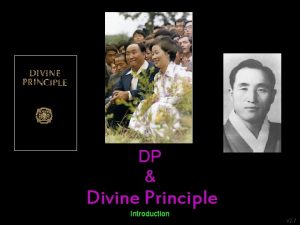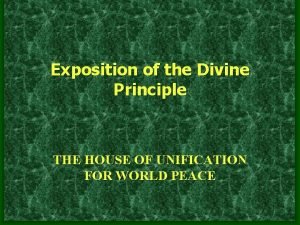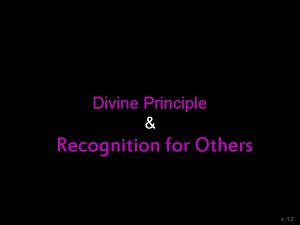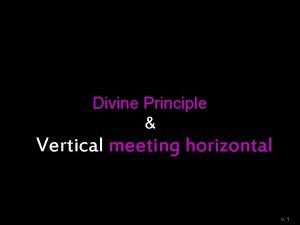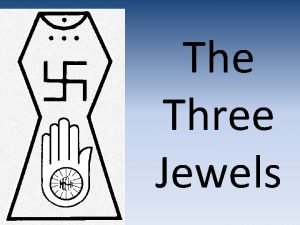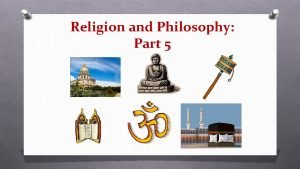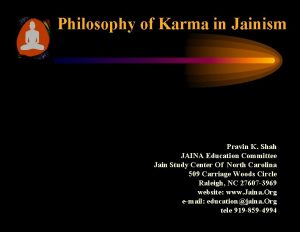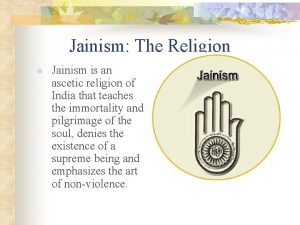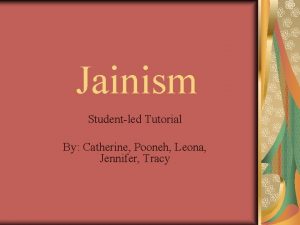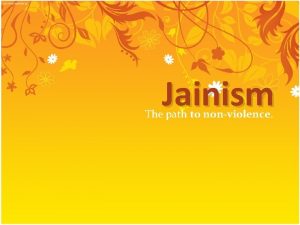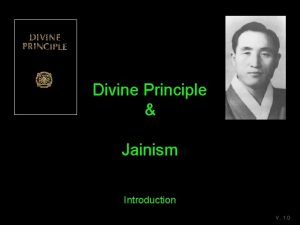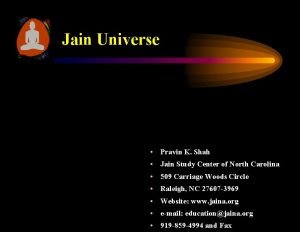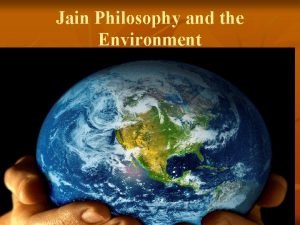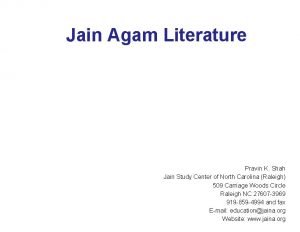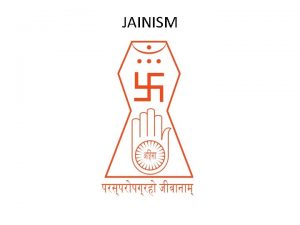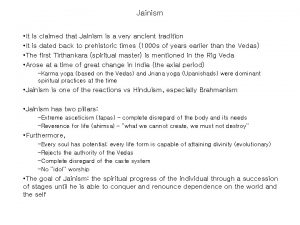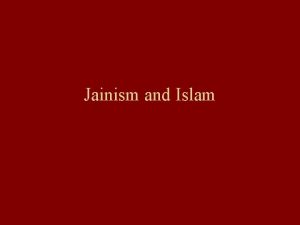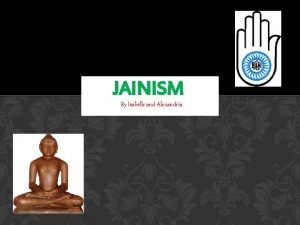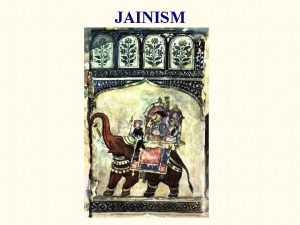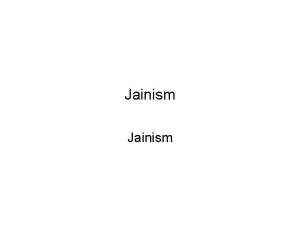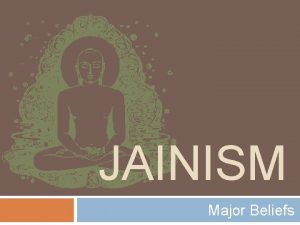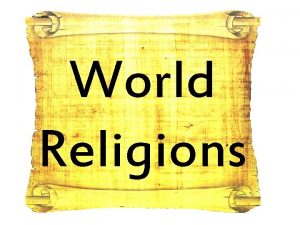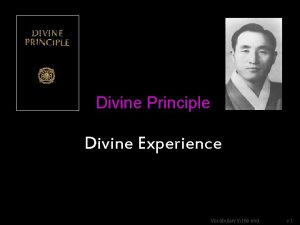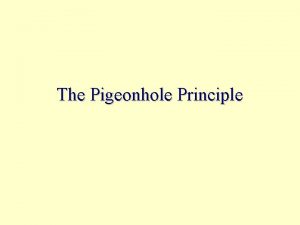Divine Principle Jainism Introduction v 1 0 Jainism
















- Slides: 16

Divine Principle & Jainism Introduction v. 1. 0


Jainism, traditionally known as Jaina dharma, is an Indian religion that prescribes a path of non-violence towards all living beings and emphasizes spiritual independence and equality between all forms of life. Practitioners believe that non-violence and self-control are the means by which they can obtain liberation.

The word Jainism is derived from a Sanskrit verb Jin which means to conquer. It refers to a battle with the passions and bodily pleasures that the jaina ascetics undertake. Those who win this battle are termed as Jina (conqueror). The term Jaina is therefore used to refer to laymen and ascetics of this tradition alike.

Jainism is one of the oldest religions in the world. Jains traditionally trace their history through a succession of twenty-four propagators of their faith known as tirthankara with Adinatha as the first tirthankara and Mahavira as the last of the current era. For long periods of time Jainism was the state religion of Indian kingdoms and widely adopted in the Indian subcontinent

Jainism is a religious minority in India, with 4. 2 million adherents, and there are small but notable immigrant communities in Belgium, Canada, Hong Kong, Japan, Singapore, and the United States. Jains have the highest degree of literacy of any religious community in India (94. 1 percent), and their manuscript libraries are the oldest in the country.

Similarities DP and Jainism • Mind over Body Controle • One of the most important and fundamental doctrines of Jainism is anēkāntavāda. It refers to the principles of pluralism and multiplicity of viewpoints, and to the notion that truth and reality are perceived differently from diverse points of view, no single one of which is complete “the parable of the blind men and an elephant” • Divine Principle also talks about the harmonius Unification of Religions. World Scriptue Vol 1 and 2, are an effort to show similarities among World faiths.

Similarities DP and Jainism • The ideally pure state of the soul has always been overlaid with the impurities of karma. – Compare with DP Fall of Man and Laws of Indemnity. • The principle of non-violence or ahimsa is the most distinctive and well known aspect of jaina religious practice. Non-violence is seen as the most essential religious duty for everyone. • Teaching of True Father, Sun Myung Moon live for others. = non-violence

Similarities DP and Jainism • Jain texts describe the shape of the universe as similar to a man standing with legs apart and arm resting on his waist. This Universe, according to Jainism, is broad at the top, narrow at the middle and once again becomes broad at the bottom. • Prior to creating human beings, God created the natural world by expressing partial reflections of the internal nature and external form He had conceived for human beings. Consequently, a human being contains within himself the sum total of the essences of all things. This is the reason he is called the microcosm of the cosmos.

Similarities DP and Jainism • DP sees the Kingdom of Heaven resembles a person who has achieved individual perfection, taking after God's original internal nature and external form. In an individual, the mind's command is transmitted to the whole body through the central nervous system, causing the body to act with one purpose. Likewise, in the Kingdom of Heaven, God's direction will be conveyed to all His children through the True Parents of humankind, guiding everyone to live as one.

Spirit World

Differences DP and Jainism • Jaina beliefs postulate that the universe was never created, nor will it ever cease to exist. It is independent and self-sufficient, and does not require any superior power to govern it. • DP believes in a Creator God/Allah/Jahve… and that Man together with angelic World and God are needed to fulfil the 3 Great Blessings.

Jains praying at the feet of a statue of Lord Bahubali. Sculpture of Mahāvīra

End

References: Divine Principle: www. unification. net/dp 96 Speeches by Sun Myung Moon: www. tparents. org/Lib-Moon-Talk. htm Wikipedia, about Jainism

Remember the beauty in Gods nature is there to inspire the most Holy original inside us all! Have a great Blessed week. Prepared for 2 nd, 3 rd. . . Gen inspiration by Bengt de Paulis.
 Divine principle 3 hour lecture
Divine principle 3 hour lecture Exposition of the divine principle
Exposition of the divine principle Divine principle powerpoint
Divine principle powerpoint Divine principle powerpoint
Divine principle powerpoint Main beliefs of jainism
Main beliefs of jainism Jainism knowledge
Jainism knowledge Hinduism hearth
Hinduism hearth Karma theory
Karma theory How jainism started
How jainism started Leona jennifer
Leona jennifer What is jainism
What is jainism 14 rajlok in jainism
14 rajlok in jainism Jain
Jain Jain way of life
Jain way of life 14 rajlok
14 rajlok Jainism diet
Jainism diet Agam literature
Agam literature
